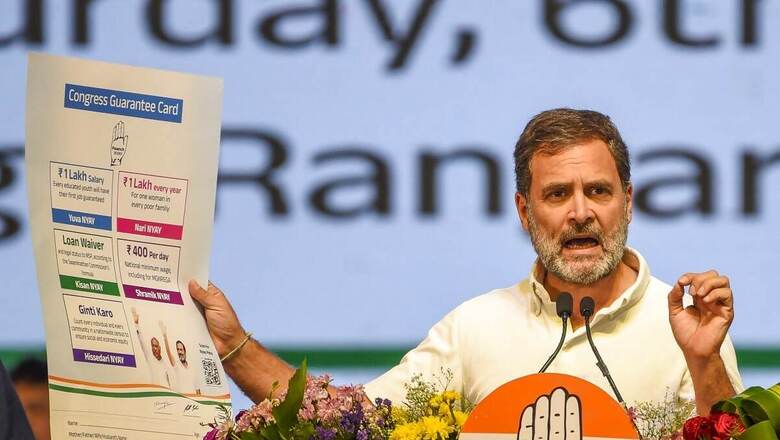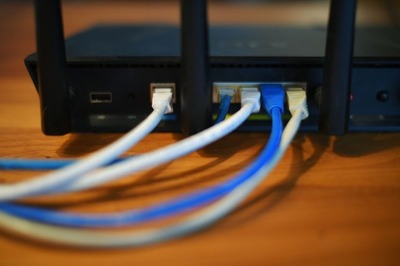
views
The Congress, two weeks away from the 2024 Lok Sabha elections, released its poll manifesto, ‘Nyay Patra’ at the AICC headquarters in New Delhi. Mallikarjun Kharge, the Congress party president, speaking at the event, said, “This manifesto will be ‘nyay ka dastavez’ (a document for justice) in the political history of the country. From the five pillars of the ‘Bharat Jodo Nyaya Yatra’—yuva (youth), kisan (farmers), naari (women), shramik (workers), and hissedari (equity), 25 guarantees will emerge.”
The Congress, which revels in economic appeasement, has promised to transfer Rs 1,00,000 a year to India’s poorest families as an unconditional cash transfer. Despite the unmerited alluring populist pledges from the party, the Indian electorates have gallingly, in motley states of the Hindi heartland, denied trading a bird in hand for the Congress’ virulent and penchant brand of ephemeral freebie politics. However, speaking of his audacious war on Revdi culture, PM Narendra Modi said, “It is important that every youngster get opportunities, not assistance that keeps them dependent but the support that makes them self-reliant to fulfil their aspirations with dignity.” Even in his days as the Gujarat chief minister, Modi resisted election-time pressures to play economic populist politics that are fiscally irresponsible ‘welfarism’ and exorbitantly unattainable.
Ever since the Bharatiya Janata Party (BJP) came to power at the Centre, their dispensation has focused on macroeconomic stability rather than announcing ruinous expenditures to garner electoral victory.
In another bizarre promise, the Congress stated, “We will amend the election laws to combine the efficiency of the electronic voting machine (EVM) and the transparency of the ballot paper.” After the unequivocal triumph of the BJP in the Hindi heartland states of Rajasthan, Madhya Pradesh, and Chhattisgarh, veteran Congress leader Digvijaya Singh tweeted, “Any machine with a chip can be hacked. Since 2003, I have opposed EVM voting. Should we permit professional hackers to manipulate our Indian democracy? This is the fundamental question that all political parties have to address.” Hilariously, despite constantly whining about EVMs, the Congress party preaches water and drinks wine in states like Karnataka and Telangana, where it has emerged victorious.
Stirring the communal cauldron, the Congress has vowed to interfere with personal choices of food and dress, to love and marry, and to travel and reside in any part of India. The party asserts that they will repeal all laws and rules that unreasonably impede personal freedoms. The grand old party has tried hard to peddle the apocalyptic narrative that ever since the BJP came into power, the Muslims in India — India’s second-largest majority community — are fraught with tension, insecurity and dread. But nothing could be further from the truth.
In fact, apart from the many welfare schemes of PM Modi that benefit the Muslims in India, his administration abolished the archaic and mediaeval practice of Triple Talaq, ensuring Muslim women lead a life of dignity. In a similar move towards empowerment, the Narendra Modi administration allowed women to proceed on Haj without Mehram. Additionally, his administration has ensured a holistic beautification process at the Ajmer Sharif Dargah, which includes the construction of ‘Silver Katahra’ at Astana Sharif, a new fountain and renovation of the Nizam Gate and Akbari Masjid.
Data-wise, the annual average household incomes for Muslims have risen from 6 per cent in 2015-16 to 21 per cent in 2020-21. According to the data, 14 per cent of India’s population, i.e., Muslims, received 31.3 per cent of houses under the Pradhan Mantri Awas Yojana, 33 per cent of funds under the PM-Kisan Samman Nidhi Yojana, and 36 per cent of loans under the Pradhan Mantri Mudra Yojana. Then there is a PM Shadi Shagun Yojana, exclusively for Muslim girls, under which they would get Rs 51,000 if they completed graduation before marriage. If this wasn’t enough to reposit the Congress party’s galling tag on PM Modi of being “anti-Muslim,” the prime minister has been conferred with the highest civilian honours of seven Muslim nations.
The Congress has made another grotesque vow, promising to implement the MSP (minimum support price) as recommended by the Swaminathan Commission, a demand that farmers have been protesting since 2020. Nonetheless, should legislation pertaining to the assurance of the minimum support price be implemented, it would necessitate an augmented expenditure of Rs 10 lakh crore annually, approximately tantamount to a quarter of the entire national budget! In fact, getting down to brass tacks, the Modi administration proffered data showcasing a surge of 115 per cent in MSP. The administration delineated that an outlay of approximately Rs 2.28 lakh crore was directed towards procuring food grains at MSP in 2022–23, marking a substantial rise from the Rs 1.06 lakh crore expenditure incurred in 2014–15.
Further, the Congress manifesto stated that it would conduct a nationwide socio-economic and caste census to enumerate the castes and sub-castes, as well as their socio-economic conditions. It has vowed to pass a constitutional amendment to raise the 50 per cent cap on reservations for SC, ST and OBC. While the Congress doctrine aims to adroitly exploit their leitmotif template of an OBC-Dalit-Muslim coalition, the BJP has distanced itself from the deleterious realm of caste-driven politics and reiterated that their governance paradigm identifies the beneficiaries only as poor, women, youth and farmers.
Interestingly, the same Congress should delve into its own sordid history, where the then PM Rajiv Gandhi decried Mandal Commission in the national parliament on December 6, 1990, addressing the speaker on record, “Sir, [V.P. Singh] Raja Sahib’s policies are not very different from what the Britishers were doing. It was the British who tried to divide our country on caste and religion, and today it is the Raja Sahib, sitting there, who is trying to divide our country on caste and religion. (Interruptions) Already, you are steering this country towards more religious electorates.” What could possibly proffer cogency and coherence to this tectonic shift in the ideology but political ineptitude and chagrin in ousting Modi?
Apart from the political cut-and-thrust, PM Modi’s governance theme of ‘Sabka Saath, Sabka Vikas, Sabka Vishwas’ has led to the untrammelled sway of his public perception. The prime minister’s unparalleled unanimous support stems from his frontal assault on the conventional caste calculus of social exclusion and economic deprivation. In addition to maintaining a consistent 8 per cent economic growth and achieving unprecedented rates of infrastructure development, Prime Minister Modi’s administration has implemented socially inclusive policies. These include initiatives such as the Ujjwala Yojana, which provides free cooking gas connections to those in need; Ayushman Bharat; distribution of food grains to over 80 crore beneficiaries; efforts to ensure access to potable water for all citizens; provision of four crore houses to eligible recipients; direct benefit transfers to farmers; and the PM Mudra Yojana, which has sanctioned 43 crore loans totalling Rs 22.5 lakh crore to support the entrepreneurial aspirations of youth and numerous other flagship programs.
The amalgam of these comprehensive initiatives has permeated and resonated across various echelons of society, garnering their allegiance and electoral endorsement. And bolstered by the milestones achieved among the multitude residing in rural sectors and impoverished communities, Narendra Modi’s political quest in 2024 assumes a solitary endeavour.
Yuvraj Pokharna is an independent journalist and columnist. He tweets with @iyuvrajpokharna. Here’s the link to Yuvraj’s official WhatsApp channel: https://whatsapp.com/channel/0029VaBKt038vd1QvwLPp515. Views expressed in the above piece are personal and solely that of the author. They do not necessarily reflect News18’s views.
















Comments
0 comment